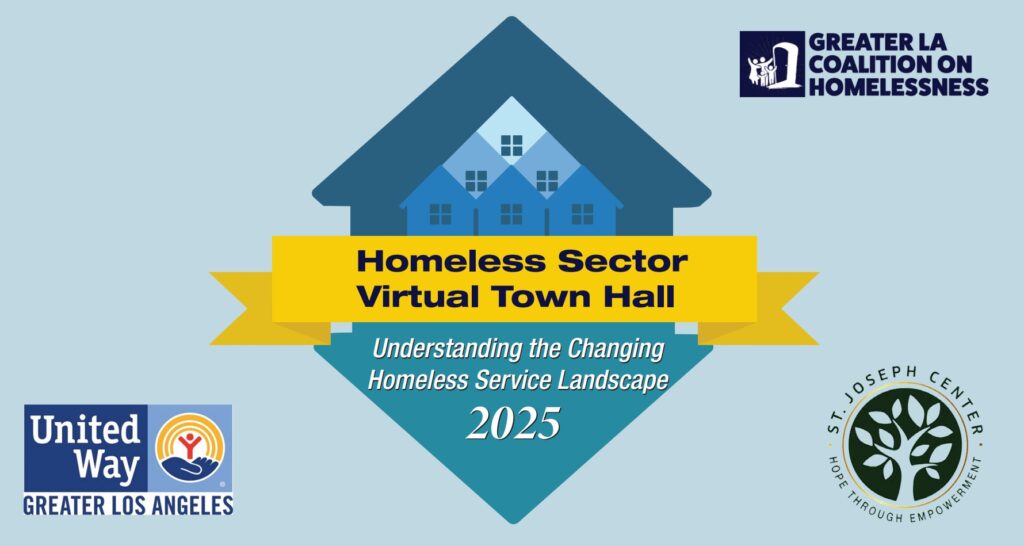On July 18, United Way of Greater Los Angeles was proud to host a virtual town hall focused on connecting global funding shifts to local impact on homelessness, featuring discussions on the establishment of a new county department for homeless services and housing. Panelists explored the transformation of funding, challenges faced by the community, and the importance of community engagement in shaping strategies. The meeting also covered federal and state budget considerations, legislation affecting housing and homelessness policies, and strategies for addressing immigration enforcement and homelessness in Los Angeles.
Connecting the Dots | Homeless Sector Townhall
The event, moderated by Hazel Lopez, the Director of Crisis Solutions at United Way of Greater LA, was co-sponsored by St. Joseph Center and the Greater LA Coalition on Homelessness, featured five segments with panelists discussing various aspects of homelessness.
County Homeless Services Department Launch
The meeting focused on the transformation of homeless services funding and the establishment of a new county department, the Department of Homeless Services and Housing. Celina introduced the panel of experts, including Leepi Shimkhada and Elena Fiayo, who discussed the new department’s role in aligning the countywide response to homelessness. The discussion emphasized the need for holistic, justice-centered solutions and highlighted the challenges faced by the community, including intensified hurdles and fear due to recent ICE raids.
“Whether it’s new initiatives, revised budgets or the recently established county department, now tasked with overseeing, homeless services, there is urgent need to bring to fruition a path forward, fueled by driving progress and accountability, that is filled with heart-centered compassion and radical leadership.”
Celina AlvarezExecutive Director of Housing Works
Housing Budget Reconciliation Challenges
Sonya Acosta, senior policy analyst in DC, discussed the reconciliation bill, explaining its limitations and impact on housing programs, noting that while it includes an expansion of the low-income housing tax credit, it also contains harmful cuts to SNAP and Medicaid. She then outlined the Appropriations process, highlighting the President’s budget proposal to block grant and cut rental assistance, as well as the House’s response, which ignored these structural changes but still resulted in insufficient funding to maintain current assistance levels. Sonya emphasized the need for additional resources to support emergency housing voucher recipients and mentioned an upcoming state-by-state breakdown of the impact of the House bill on housing choice vouchers.
California’s Homelessness Budget Challenges
Alex Vizotsky, a senior California policy fellow for the National Alliance to End Homelessness, discussed the state’s approach to homelessness, highlighting the political challenges and budget decisions. He explained that while homelessness remains a priority for California voters, there is a lack of connection between housing affordability and homelessness, which affects policy decisions. Alex outlined four key conversations in Sacramento: accountability, interjurisdictional finger-pointing, temporary solutions, and criminalization. He also noted that despite potential federal cuts, the state’s budget conversation continues as usual, with no significant shift in revenue raising or taxation. Alex concluded by discussing the securing of $500 million for the HAP program, a cut from previous years, and the potential impact on the Los Angeles region.
“It’s important to remember we have a governor who appears to continue to have national political ambitions, and and that means that he’s going to approach his his political vulnerabilities in a highly kind of calculated and political manner. And homelessness continues to be a real soft spot for him where you know folks on the right. Folks on the center are are poking him because because homelessness has not been solved in California because homelessness continues to be a crisis across California.”
Alex VizotskyCalifornia Policy Fellow, National Alliance to End Homelessness
Empowering Vulnerable Communities Through Partnerships
Christina discussed the EHV program as a commitment to vulnerable clients and emphasized the importance of proactive planning and partnership. Council Member Eunisses Hernandez shared her experiences and strategies for addressing immigration enforcement and homelessness in Los Angeles, highlighting the need for community empowerment and resource allocation. The panelists discussed the importance of filling gaps created by the Trump administration and the need for continued protest and community support.
“The EHV program is more than just a housing initiative. It’s a it’s a commitment to our most vulnerable clients, our neighbors, and we are committed to doing everything in our power to uphold commitment.”
Christina LupoAssistant Director of Section 8, Housing Authority of the City of Los Angeles
Next Steps
Attendees were encouraged to call their Assembly Member and encourage them to support and vote yes on SB 634. Organizations were also encouraged to support AB 1165 for ongoing funding for homelessness, and to continue their work in housing and supporting unhoused individuals by engaging in community-building activities to resist harmful policies and fill gaps in services.
